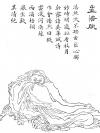Biography
Other info : Furtherreading
Meng Haoran (Chinese: 孟浩然; pinyin: Mèng Hàorán; Wade–Giles : Meng Hao-jan; Japanese: Mōkōnen) (689 or 691 – 740, during the Tang Dynasty) was a major Tang Dynasty poet, and a somewhat older contemporary of Wang Wei, Li Bo and Du Fu. Despite his brief pursuit of an official career, Meng Haoran mainly lived in and wrote about the area in which he was born and raised, in what is now the province of Hubei, China. Meng Haoran was a major influence on other contemporary and subsequent poets of the High Tang era because of his focus on nature as a main topic for poetry. Meng Haoran was also prominently featured in the Qing Dynasty (and subsequently frequently republished) poetry anthology Three Hundred Tang Poems, having the fifth largest number of his poems included, for a total of fifteen, exceeded only by Du Fu, Li Bo, Wang Wei, and Li Shangyin. These poems of Meng Haoran were available in the English translations by Witter Bynner and Kiang Kanghu, by 1920, with the publication of The Jade Mountain. The Three Hundred Tang Poems also has two poems by Li Bo addressed to Meng Haoran, one in his praise and one written in farewell on the occasion of their parting company. Meng Haoran was also influential to Japanese poetry.
First of the major High Tang poets, Meng Haoran was born in Xiangyang, in what is now a district south of the Han River (a tributary of the Yangzi River), in modern Xiangfan in the province of Hubei. He remained strongly attached to this area and its scenery throughout his life. He had a rather abbreviated civil service career, passing the Jinshi civil service test, beginning at the late age of 39 and ending not much later. He received his first and last position three years before his death, but resigned after less than a year. He lived in the Xiangyang area almost all his life (although he traveled to the major metropolis of Chang'an, where he was hosted by Wang Wei in 728). The landscape, history and legends of his home area are the subjects of many poems. Particularly prominent are Nanshan (or South Mountain, his family seat) and Lumen Shan, a temple site, where he briefly lived in retreat.






